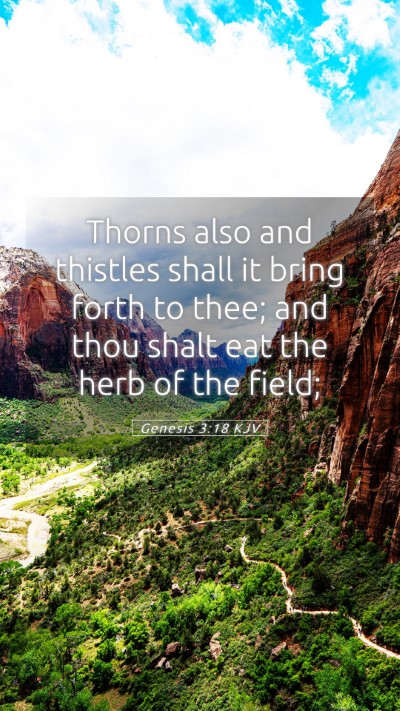Understanding Genesis 3:18
Genesis 3:18 states, "Thorns also and thistles shall it bring forth to thee; and thou shalt eat the herb of the field." This verse serves as part of the curse pronounced upon the ground as a consequence of Adam and Eve's disobedience to God, marking a significant shift in the relationship between humanity and creation.
Bible Verse Meanings
In this context, the thorns and thistles symbolize the hardships and suffering that will accompany mankind's toil. The transition from ease to difficulty can be seen as a direct consequence of sin, illustrating the broader theme of fall and redemption that permeates Scripture.
Bible Verse Interpretations
The verse reveals not only the physical struggles that humanity will face in their labor but also the spiritual implications. Matthew Henry emphasizes that this illustrates a marked difference between pre- and post-fall existence. Before sin entered the world, labor was peaceful and fruitful; after, it became fraught with challenges.
Insights from Renowned Commentators
-
Matthew Henry:
Henry considers this verse as God’s way of conveying that labor would now come with suffering, and the ease of obtaining sustenance would become arduous. This serves as a divine reminder of the consequences of sin.
-
Albert Barnes:
Barnes notes that God’s declaration about the earth yielding thorns mirrors the struggles faced not only in agricultural endeavors but also spiritually. The 'herb of the field' can be interpreted as the sustenance that is still provided by God despite the fallen state of creation.
-
Adam Clarke:
Clarke posits that the wrath of God was reflected in nature itself, signifying a deep-rooted challenge imposed upon humanity. He elaborates that the difficulty in obtaining food is paralleled by the complexities introduced in human life and society.
Application of the Verse
This verse invites contemporary believers to reflect on the nature of their work and the challenges they face. Understanding Genesis 3:18 fosters a recognition of God’s ongoing involvement in the upkeep of creation and provides a profound lesson in humility, resilience, and reliance on divine assistance.
Biblical Exegesis and Analysis
When undertaking a closer examination of Genesis 3:18, one finds numerous themes emerging, such as the dichotomy of ease versus toil, the relationship between sin and nature, and the promise of sustenance amid struggle. Indeed, the verse sets the stage for the necessity of divine grace that permeates biblical teaching.
Related Bible Cross References
- Genesis 3:17: Discusses the curse on the ground for Adam’s sake.
- Romans 8:20-22: Explores creation’s futility and expectation for redemption.
- Ecclesiastes 2:23: Reflects on the toil of man and the challenges of labor.
- Genesis 4:12: Illustrates the struggles following the fall, particularly through Cain’s experience.
- Galatians 6:7-8: Offers insight into the principle of sowing and reaping, reinforcing the consequences of actions.
Conclusion
Genesis 3:18 holds deep significance in understanding humanity’s condition post-fall. The combined insights from respected theologians and the challenges presented in the verse encourage a greater understanding of our responsibility in life’s labors, reminding readers of the importance of seeking God in all endeavors. Engaging with this Scripture can serve as a valuable resource in Bible study groups, guiding discussions around the themes of sin, grace, and redemption.


